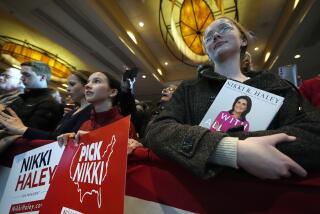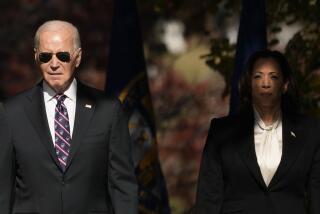Obama news conference lays bare politics at center of shutdown
Much of President Obama’s press conference Tuesday was dedicated to pushing his case that Republican recalcitrance has brought the nation to the brink of default amid a government shutdown. But in two asides he laid bare the reason the dispute has been so intractable.
“I mean, the truth is, is that the parties are pretty divided on a whole bunch of big issues right now,” he said in answer to the first question. “Everybody understands that. And, by the way, voters are divided on a lot of those issues too.
“And I recognize that there are some House members, Republican House members, where I got clobbered in the last election,” he continued. “And, you know, they don’t get politically rewarded a lot for being seen as negotiating with me. And that makes it harder for divided government to come together.”
Later he got more specific:
“A big chunk of the Republican Party right now is -- are in gerrymandered districts where there’s no competition, and those folks are much more worried about a tea party challenger than they are about a general election where they’ve got to compete against a Democrat or go after independent votes. And in that environment, it’s a lot harder for them to compromise.”
FULL COVERAGE: The U.S. government shutdown
And many Democrats, he might have added, represent similarly homogeneous districts. Because of the way districts are drawn, and the tendency of people to live with like-minded sorts, Republican officeholders in South Carolina can hear only from citizens who oppose Obama’s agenda, and be utterly sincere in their belief that that represents the world writ large. And at the same time Democratic officeholders in, say, California, hear only from those who oppose House Republicans just as strongly, and take that as the world view.
Research by David Wasserman of the Cook Political Report starkly illustrated the reality that has driven the budget impasse: There are few places where voters simultaneously voted for Obama for president and a Republican for Congress—or for Mitt Romney for president and a Democrat for Congress. That sharply limits the crossover voters who might be used by either side as a threat to force everyone to the bargaining table.
The numbers show, as well, how much more polarized the nation has become since the last budget shutdown during the first Clinton administration, and, as a result, how limited that experience is in predicting the outcome this time.
Wasserman found that in 1995, 79 House Republicans represented districts Clinton had won. Today, only 17—7% of the Republicans in the House—are in Obama-won districts. In 1995, only 73 Republicans came from solid Republican districts. Now that figure is 122. (Conversely, then 44 House Republicans represented Democratic-leaning seats, a figure that has plummeted to five today.)
PHOTOS: 2013’s memorable political moments
Those numbers demonstrate why House Republicans have hewed to their threat to shut down the government rather than support the president’s healthcare plan. And they also demonstrate why, despite polls consistently showing them taking most of the blame for the standoff, most of them will pay little price for it.
Obama’s remark about the larger threat posed by a challenge to those House members from the right, in a primary, is born out in polling.
Tea party voters, in many places the most energized of the Republican Party’s activists and its most dependable voters, almost universally object to the healthcare program at the center of the impasse. In a Pew Research Center survey, nearly nine in 10 of them, an unusually high proportion in polling on any subject, disapproved of it very strongly.
While most voters, no matter their views on Obamacare, wanted legislators to make it work rather than eradicate it, about two-thirds of tea party-aligned voters wanted it to fail.
Wasserman and the Cook Political Report also drew distinctions between the 80 House members who pressured Speaker John Boehner to threaten a shutdown in order to gut the healthcare plan, and the far-smaller number who have said they would approve a budget agreement absent the Obamacare restriction.
The average district represented by GOP members who favored the gut-Obamacare strategy voted 14 points more Republican than the nation as a whole. Without any meaningful competition from Democrats, those officeholders had far more worry about a conservative primary challenge, and far less concern about appealing to independent or moderate voters .
PHOTOS: Team Obama, where are they now?
And among those who were willing to forgo the Obamacare strategy? Their districts voted only 4 points more Republican than the national average—meaning that they were much more vulnerable to a Democratic challenge than one from the right, and stronger politically if they hewed to a moderate course.
Twitter: @cathleendecker
More to Read
Start your day right
Sign up for Essential California for news, features and recommendations from the L.A. Times and beyond in your inbox six days a week.
You may occasionally receive promotional content from the Los Angeles Times.







